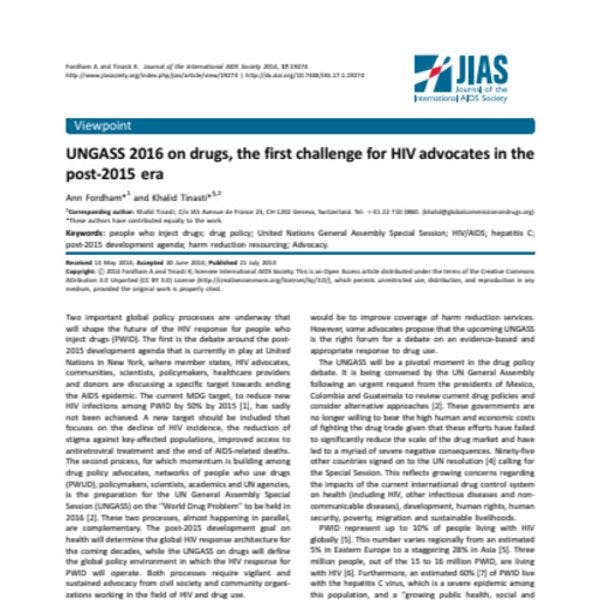La UNGASS sobre drogas de 2016: el primer desafío para los promotores de la lucha contra el VIH en la era post-2015
El debate en torno a la agenda de desarrollo post-2015 y la UNGASS sobre drogas de 2016 determinará el futuro de la respuesta del VIH entre las personas que se inyectan drogas. Más información, en inglés, está disponible abajo.
Suscríbase a las Alertas mensuales del IDPC para recibir información sobre cuestiones relacionadas con políticas sobre drogas.
By Ann Fordham (IDPC) and Khalid Tinasti (Global Commission on Drug Policy)
Two important global policy processes are underway that will shape the future of the HIV response for people who inject drugs (PWID).
The first is the debate around the post-2015 development agenda that is currently in play at United Nations in New York, where member states, HIV advocates, communities, scientists, policymakers, healthcare providers and donors are discussing a specific target towards ending the AIDS epidemic. The current MDG target, to reduce new HIV infections among PWID by 50% by 2015, has sadly not been achieved. A new target should be included that focuses on the decline of HIV incidence, the reduction of stigma against key-affected populations, improved access to antiretroviral treatment and the end of AIDS-related deaths.
The second process, for which momentum is building among drug policy advocates, networks of people who use drugs (PWUD), policymakers, scientists, academics and UN agencies, is the preparation for the UN General Assembly Special Session (UNGASS) on the “World Drug Problem” to be held in 2016. These two processes, almost happening in parallel, are complementary. The post-2015 development goal on health will determine the global HIV response architecture for the coming decades, while the UNGASS on drugs will define the global policy environment in which the HIV response for PWID will operate.
Both processes require vigilant and sustained advocacy from civil society and community organizations working in the field of HIV and drug use.
Keep up-to-date with drug policy developments by subscribing to the IDPC Monthly Alert.
Temas
Regiones
Perfiles relacionados
- International Drug Policy Consortium (IDPC)
- Global Commission on Drug Policy
- Ann Fordham
- Khalid Tinasti
